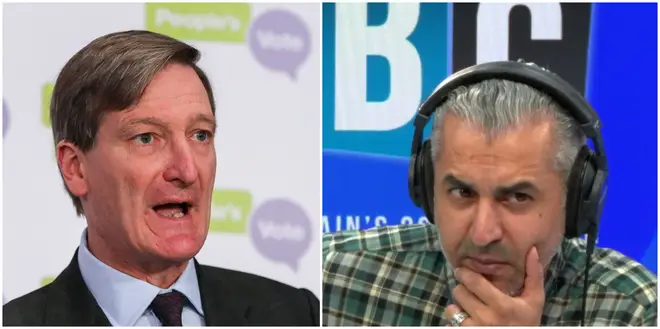
Nick Abbot 10pm - 1am
20 October 2019, 15:41 | Updated: 20 October 2019, 15:45
The former Attorney General thinks that a general election wouldn't provide a majority for any party and, for that reason, he prefers another strategy to overcome the Brexit deadlock.
Maajid Nawaz put it to Dominic Grieve that there "appears to be two routes ahead of us" - one being a delay and a general election, the other being a delay and a second referendum.
Dominic Grieve replied: "My view is that the better course of action is to have a referendum, followed by general election. The referendum would finally resolve Brexit, and it would resolve it in a way which also gave a powerful indication that people wanted something.
"So the idea, for example, if people wanted to leave with Boris Johnson's deal, it would make it much harder later on for my colleagues in the ERG to try to dismantle that deal afterwards. Because you could say, well hang on the public voted for this deal, including a future trade agreement.

"Obviously, if people voted to remain in the EU, well, then we will remain in the EU and we'll have to pick up the pieces and carry on. But I think it would be much clearer and that's what I would like to achieve, but I have to recognise that it's only going to be achieved if a majority of MPs in the House of Commons are prepared to vote to have a referendum.
"And then you still have to carry it out which you need the support of the government to do. So I don't want to exaggerate the chances of getting it but I continue to believe it's the best way out of the current crisis.
"The alternative is one of two things are going to happen. One is that we, we do get taken out by Boris Johnson through the process he's now embarked on and that will be followed by general election. We'll have to see what happens next year.
"Or we have a general election first, which might help solve a problem, but I have some doubts about it.
Because on current opinion polling, I don't think there's going to be any party in Parliament that has a working majority."
Maajid mentioned that is what happened with Theresa May's snap election.
Grieve continued: "Exactly, that's what happened with her in 2017. So I think there's a serious risk that parliament will not be able to resolve it by that method. So I tried to be pretty candid about my views, I realised that lots of people are angry.
"There are lots of people saying 'oh, for goodness sake, let's just get it over with, why can't you just do something?' But people have got to understand that I think often they don't understand why it is that MPs are finding this so difficult.
"The truth is that there's a majority in parliament which looks at deals and thinks this really is not taking us to a very good place.
So do we just ignore and obey the will of the people and take us out regardless? Or do we try to find some alternative way of solving this?"
They then spoke about the serious division among Brexiters. He also warned about the length of the Brexit process.
He said that the Brexit process could take five to 10 years.
Grieve also said that the EU might be convinced to let the UK have an extension if they hold a referendum.